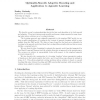Free Online Productivity Tools
i2Speak
i2Symbol
i2OCR
iTex2Img
iWeb2Print
iWeb2Shot
i2Type
iPdf2Split
iPdf2Merge
i2Bopomofo
i2Arabic
i2Style
i2Image
i2PDF
iLatex2Rtf
Sci2ools
155
click to vote
ALT
2002
Springer
2002
Springer
Optimally-Smooth Adaptive Boosting and Application to Agnostic Learning
We describe a new boosting algorithm that is the first such algorithm to be both smooth and adaptive. These two features make possible performance improvements for many learning tasks whose solutions use a boosting technique. The boosting approach was originally suggested for the standard PAC model; we analyze possible applications of boosting in the context of agnostic learning, which is more realistic than the PAC model. We derive a lower bound for the final error achievable by boosting in the agnostic model and show that our algorithm actually achieves that accuracy (within a constant factor). We note that the idea of applying boosting in the agnostic model was first suggested by Ben-David, Long and Mansour and the solution they give is improved in the present paper. The accuracy we achieve is exponentially better with respect to the standard agnostic accuracy parameter β. We also describe the construction of a boosting “tandem” whose asymptotic number of iterations is the ...
Agnostic Accuracy Parameter | ALT 2002 | Machine Learning | Noise Tolerant Boosting | Smooth Boosting |
Related Content
| Added | 15 Mar 2010 |
| Updated | 15 Mar 2010 |
| Type | Conference |
| Year | 2002 |
| Where | ALT |
| Authors | Dmitry Gavinsky |
Comments (0)

